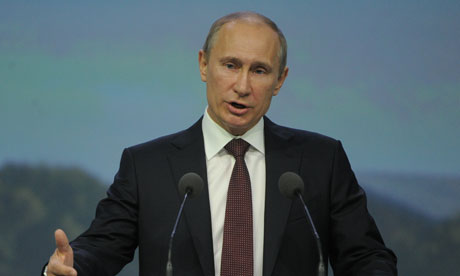Russian President Vladimir Putin on Monday met Zionist leaders on a rare trip to the Jewish state for discussions that focused on the Syria crisis and Iran’s disputed nuclear program.
 Russian President Vladimir Putin on Monday met Zionist leaders on a rare trip to the Jewish state for discussions that focused on the Syria crisis and Iran's disputed nuclear program.
Russian President Vladimir Putin on Monday met Zionist leaders on a rare trip to the Jewish state for discussions that focused on the Syria crisis and Iran's disputed nuclear program.
In statements to the press after their meeting, Putin and the Zionist Prime Minister Benjamin Netanyahu praised ties between their two countries, and pledged cooperation on a range of domestic and international issues.
Their talks touched on the situation in Syria pitting the West against Moscow, which has refused to support sanctions against Arab state.
"From the very beginning of the so-called Arab Spring, Russia has been persuading its partners that democratic changes should take place in a civilized manner and without external intervention," Putin said.
Russia is pushing for an international Syria conference and has already discussed the plan with Jordan as well as the European Union, Iran and Iraq.
Putin said he had also discussed Iran's nuclear program with Netanyahu, but gave no details about the talks.
Israel, which is widely believed to have the Middle East's sole if undeclared nuclear arsenal, has claimed Iran's program poses an existential threat and has warned it reserves itself the right to use all means necessary to respond, including military, despite the Iranian response to the international community that it enriches uranium for civil purposes only.
Speaking alongside Putin on Monday, Netanyahu again warned that Iranian nuclear weapons would pose "a severe danger, first and foremost to his Zionist entity, but also to the region and entire world."
The international community has been pursuing talks with Tehran in recent months, and three high-level meetings were held.
On Tuesday, Putin is to meet with Palestinian president Mahmud Abbas in the West Bank city of Bethlehem for talks likely to focus on the stalled peace process.
The peacemaking Quartet, which groups Russia, the United States, European Union and United Nations, has been trying to nudge the two sides back to direct talks, on hold since late 2010.
